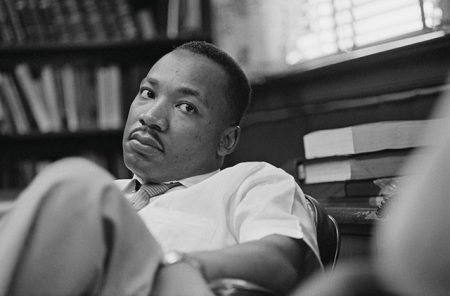In April 1963, the nation’s attention was transfixed on Birmingham, Alabama, as thousands of black citizens, led by Rev. Martin Luther King, Jr. (1929-1968) and Rev. Fred Shuttlesworth, protested racial discrimination. Despite the non-violent principles of the movement, King was arrested on Good Friday and put in solitary confinement. Days later Eugene “Bull” Connor, the town’s commissioner of public safety, tired of the protests and turned both fire hoses and attack dogs on the demonstrators. The nation recoiled. A number of clergy published a rebuke of King, lamenting his methods and saying he should have been more patient.1 In a letter that became a manifesto of civil rights, King explained why injustice could no longer be tolerated, even if it meant suffering persecution for righteousness. King’s courage to stand helped to bring reality into focus among his contemporaries, and it provides an inspiring example for us in the present:
One of the basic points in your statement is that the action that I and my associates have taken in Birmingham is untimely. Some have asked: “Why didn’t you give the new city administration time to act?” . . .
We know through painful experience that freedom is never voluntarily given by the oppressor; it must be demanded by the oppressed. Frankly, I have yet to engage in a direct-action campaign that was “well timed” in the view of those who have not suffered unduly from the disease of segregation. For years now I have heard the word “Wait!” It rings in the ear of every Negro with piercing familiarity. This “Wait” has almost always meant “Never.” We must come to see, with one of our distinguished jurists, that “justice too long delayed is justice denied.”
We have waited for more than 340 years for our constitutional and God-given rights. The nations of Asia and Africa are moving with jet-like speed toward gaining political independence, but we still creep at horse-and-buggy pace toward gaining a cup of coffee at a lunch counter. Perhaps it is easy for those who have never felt the stinging darts of segregation to say, “Wait.” But when you have seen vicious mobs lynch your mothers and fathers at will and drown your sisters and brothers at whim; when you have seen hate-filled policemen curse, kick and even kill your black brothers and sisters; when you see the vast majority of your twenty million Negro brothers smothering in an airtight cage of poverty in the midst of an affluent society; when you suddenly find your tongue twisted and your speech stammering as you seek to explain to your six-year-old daughter why she can’t go to the public amusement park that has just been advertised on television, and see tears welling up in her eyes when she is told that Funtown is closed to colored children, and see ominous clouds of inferiority beginning to form in her little mental sky, and see her beginning to distort her personality by developing an unconscious bitterness toward white people; when you have to concoct an answer for a five-year-old son who is asking: “Daddy, why do white people treat colored people so mean?”; when you take a cross-county drive and find it necessary to sleep night after night in the uncomfortable corners of your automobile because no motel will accept you; when you are humiliated day in and day out by nagging signs reading “white” and “colored”; when your first name becomes “nigger,” your middle name becomes “boy” (however old you are) and your last name becomes “John,” and your wife and mother are never given the respected title “Mrs.”; when you are harried by day and haunted by night by the fact that you are a Negro, living constantly at tiptoe stance, never quite knowing what to expect next, and are plagued with inner fears and outer resentments; when you are forever fighting a degenerating sense of “nobodiness”—then you will understand why we find it difficult to wait. There comes a time when the cup of endurance runs over, and men are no longer willing to be plunged into the abyss of despair. I hope, sirs, you can understand our legitimate and unavoidable impatience.2
Footnotes:![]()
1 “Statement by Alabama Clergymen, April 12, 1963,” The Martin Luther King, Jr. Paper Project at Stanford University Website,http://www.stanford.edu/group/King/frequentdocs/clergy.pdf.
2 Martin Luther King, Jr. “Letter from a Birmingham Jail, April 16, 1963,” The Martin Luther King, Jr. Paper Project at Stanford University Website,http://www.stanford.edu/group/King/frequentdocs/birmingham.pdf.





